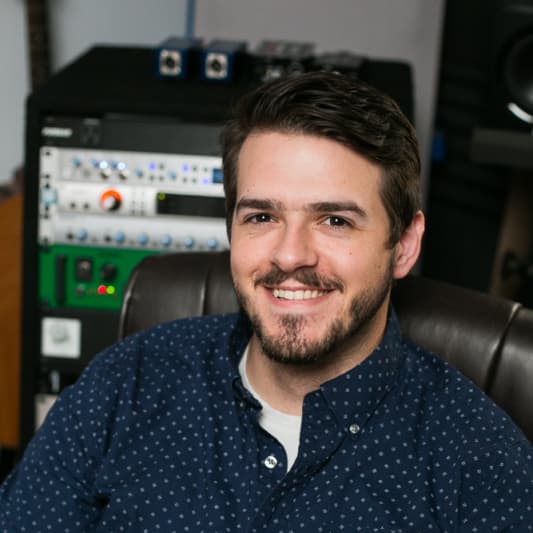
While the performance is pinnacle, having the ability to accurately and truthfully capture music is why artists trust audio engineers. Racks of preamps cannot create art but are critical to the reproduction of the art that is produced in the studio. I strive to provide quality equipment in a comfortable atmosphere.
I started my career touring in a deathcore band from CT named Ark of the Covenant (Facedown Records). After we disbanded in 2014 I opened up Auburn Recording Studios and have been fortunate to work with awesome musicians in several genres. My work has been nominated and won several Josie Awards and I am pleased to be on the board of directors for the Rhode Island Songwriters Association (RISA).
Send me a note through the contact button above.
Interview with Auburn Recording Studios
Q: What advice do you have for a customer looking to hire a provider like you?
A: Get in touch! I want to create partnerships and relationships that last!
Q: If you were on a desert island and could take just 5 pieces of gear, what would they be?
A: I love my Telecaster! I would definitely bring that as well as my mid-80's Fender Reverb London amp. There's something about that amp that has a very unique sound! In addition, I would take my computer, UA Apollo interface, and finally my mid-70's Wurlitzer.
Q: What was your career path? How long have you been doing this?
A: I have been a professional musician for almost 15 years but I have been recording for the last 4 professionally.
Q: How would you describe your style?
A: I try to bridge the gap between polished and real. My goal is to make a record that sounds great but not perfect!
Q: What type of music do you usually work on?
A: I play jazz and reggae but I enjoy working on multiple genres. Having a variety of different styles of music is one of my favorite parts of my work!
Q: What's your strongest skill?
A: I am very detail oriented. I enjoy audio because the smallest changes can make a big difference in the end.
Q: What do you bring to a song?
A: The most important thing any audio engineer brings to a song is a fresh set of ears. I'm able to listen to the song without knowing all the hard work that went into creating it, giving me a unique perspective closer to what your fans will experience.
Q: What's your typical work process?
A: Audio production is built on good foundations. It's important to get all the files in order then dive right in! I like to make gut decisions based on how the song makes me feel.
Q: Tell us about your studio setup.
A: I run ProTools 12 and Logic X as DAWs. I have a variety of preamps from Art, Focusrite, JoeMeek, Presonus, and Universal Audio. In addition to vintage amps I run most reamped guitars and basses through the Axe FX Ultra or Softube amp simulators. I like to mix and master in the box with plugins from Avid, Izotope, SoundToys, Universal Audio, and Waves.
Q: What other musicians or music production professionals inspire you?
A: Brian Hood is a major influence in my work ethic. Mixing engineers like Matthews Weiss and Graham Cochrane are also influential.
Q: Describe the most common type of work you do for your clients.
A: Typically I am with an artist from day 1. We sit down and discuss the goal and vision of the project, then track and edit each part. After everything is put down and edited I mix and master the songs.
- Mastering EngineerAverage price - $100 per song
- Mixing EngineerAverage price - $150 per song
20% Discount for SoundBetter Visitors



